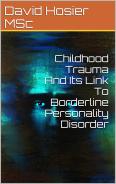Tags
Childhood Trauma: Famous People who Experienced It. Kurt Cobain.
Childhood Trauma: Kurt Cobain (1967-1994).
I was a big fan of Kurt Cobain and his band, Nirvana. I therefore remember where I was when I first heard news of his death – it came on the TV in the gym I was in at the time (in an uninspiring town called Watford just north of London, UK, as you ask). I had three things in common with him. I was born in the same year as he was (1967) and, also like him, had developed a considerable degree of both emotional and behavioural instability (despite doing, somehow, an MSc at the time). Thirdly, we had both experienced significant childhood trauma. (Actually, his parents divorced when he was seven years old, whilst mine had divorced when I was eight years old, so that’s very nearly four things in common. I was not, however, to the best of my recollection, an international grunge rock superstar.)
Like many sensitive children, it was obvious from an early age that Kurt Cobain was very creative. Also, like an increasingly large number of young people these days ( and it is certainly argued in some quarters that this ‘condition’ is over-diagnosed) he was labelled ‘HYPERACTIVE’ – now usually described as having ADHD (‘ATTENTION DEFICIT HYPERACTIVITY DISORDER’) and prescribed the drug called RETALIN (paradoxically, retalin is a derivative of amphetamine which, itself, more usually has a stimulant effect).
Due to his extreme sensitivity, Kurt Cobain experienced great distress and emotional trauma as a result of his parents’ divorce. When this shattering event occurred, he was just seven years old. It is recorded that he reported feeling unloved and deeply insecure after the divorce took place.
On top of all this, his life was made chaotic and disorganized by frequent moves to different geographical locations during which period he stayed with various different sets of relatives; this pattern of constant transience meant relationships he tried to form became disrupted and truncated.
Like many young people suffering from emotional distress, Kurt Cobain learned to mentally ‘escape’ – in his case by losing himself in his music and developing his enormous musical talent.
The psychological symptoms of his tortured emotional state started to manifest themselves in the form of INSOMNIA and a chronic stomach complaint which may well have been PSYCHOSOMATIC in origin ( the word ‘psychosomatic’ refers to the mechanism whereby mental stress causes physical problems – in other words, the mind’s effect upon the body).
In order to try to cope with his feelings of intense pain (both mental and physical) he started to ‘self-medicate’ with narcotics. (Psychologists would describe this as ADOPTING A MALADAPTIVE COPING MECHANISM IN ORDER TO DISSOCIATE FROM INTOLERABLE PAIN; see my post entitled: CHILDHOOD TRAUMA, BORDERLINE PERSONALITY DISORDER (BPD) AND DISSOCIATION in order to learn more about the phenomenon of dissociation acting as a psychological defense mechanism.)
When his band, Nirvana, became an international sensation, the effects of fame (as many famous people discover too late) caused him further severe stress. He was not comfortable around the media and found the attention, in general, overwhelming and intrusive. He became deeply, clinically depressed, complained that he derived no pleasure whatsoever from performing in front of thousands of adoring fans, and, eventually, attempted suicide in March 1994. He entered a coma and was hospitalized.
Very soon after this, he entered a drug rehabilitation facility in Los Angeles in an attempt to address his drug addiction. Within two days, however, he fled the hospital, and, overwhelmed by feelings of despair and utter hopelessness, committed suicide in his home by first injecting himself with a massive overdose of heroin and then shooting himself in the head using a shotgun.
It is a very sad fact that many talented and creative people seem to be more prone than average to extreme mental turmoil. Kurt Cobain was one such person, and, this, tragically, led to a vastly talented, perceptive and sensitive human being’s life coming to a far too premature end.
David Hosier BSc Hons; MSc; PGDE(FAHE).



